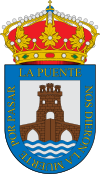Cieza, Murcia
| Cieza | |||
|---|---|---|---|
| Municipality | |||

Hermitage of the Saint Christ of Consolation.
|
|||
|
|||
| Location in Spain. | |||
| Coordinates: 38°15′N 1°25′W / 38.250°N 1.417°WCoordinates: 38°15′N 1°25′W / 38.250°N 1.417°W | |||
| Country |
|
||
| Community | Region of Murcia | ||
| Province | Murcia | ||
| Government | |||
| • Mayor | Antonio Tamayo González | ||
| Area | |||
| • Total | 365.1 km2 (141.0 sq mi) | ||
| Elevation | 188 m (617 ft) | ||
| Population (2010) | |||
| • Total | 35,385 | ||
| • Density | 97/km2 (250/sq mi) | ||
| Demonym(s) | Ciezanos | ||
| Time zone | CET (UTC+1) | ||
| • Summer (DST) | CEST (UTC+2) | ||
| Postal code | 30530 | ||
| Website | Official website | ||
Cieza is a town and municipality in Spain, in the autonomous community of Murcia. It is the capital of the Vega Alta comarca, an old form of provincial subdivision). Its current population is around 40,000. The Segura River passes by the town.
Its economy is based on agriculture, mainly in the cultivation of peaches and olives, but industry is also important, since 4,000 people work in that sector. The public sector, transports and tourism are also very important in the local economy.
Populated since the Paleolithic Age, the area of Cieza is home to archaeological excavations in Almadenes, La Serreta, and Barranco de los Grajos.
There are also Iberian remains (found at Bolvax), as well as Roman, Visigothic, and Arabic deposits. The Arabs, who inhabited the area from the eleventh to thirteenth centuries, and who knew the area as Medina Siyâsa, left behind a mountain fortress. At the dig site of Medina Siyâsa, many decorative architectural elements have been found, such as engraved arches and porticos, and polychromed ceramics, glass, metals, etc. All these discoveries are kept in the museum of Siyâsa.
The Ermita ("hermitage") de la Virgen del Buen Suceso is located in the area known as Collado de la Atalaya. The Plaza de España is located in the heart of the city. The modern market was built in 1929 by Julio Carrilero.
...
Wikipedia



